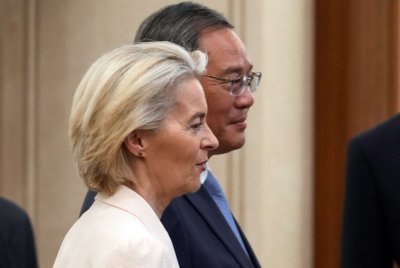
European Commission President Ursula von der Leyen (F) and Chinese Premier Li Qiang arrive at Beijing’s Great Hall of the People on Thursday amid the 25th EU-China Summit. Photo by Kumar A. Manesh/EPA
July 24 (UPI) — A European Union-China summit in Beijing on Thursday saw Chinese President Xi Jinping‘s call for closer ties met with a reality check from European Commission President Ursula von der Leyen over China’s $359 billion trade surplus with the EU.
Xi told the high-level gathering, marking 50 years of diplomatic relations between Brussels and Beijing, that rising current geopolitical frictions demanded the two sides strengthen their “mutually beneficial” relationship.
“The more severe and complex the international situation is, the more China and the EU should strengthen communication, enhance mutual trust, and deepen cooperation,” Xi told the EU delegation headed by von der Leyen and European Council President Antonio Costa.
Telling them that the problems Europe was facing “do not come from China,” Xi urged the EU to deal with tensions and disagreements properly, keep its market open and refrain from resorting to measures targeting trade, including tariffs.
However, Von der Leyen pushed back, saying relations were at a critical point where the Chinese leadership needed to prioritize the huge trade imbalance between the EU and China.
“As our cooperation has deepened, so have the imbalances. We have reached an inflection point. Rebalancing our bilateral relations is essential. Because to be sustainable, relations need to be mutually beneficial. To achieve this, it is vital for China and Europe to acknowledge our respective concerns and come forward with real solutions,” she said.
Trade tensions have taken a toll on the relationship after Brussels, accusing China of unfair subsidies, hiked tariffs on Chinese electric vehicles while Beijing targeted imports of European brandy, pork, and dairy products with anti-dumping investigations.
China has also restricted government purchasing of EU-made medical devices in retaliation for Brussels making it much more difficult for Chinese suppliers to bid for EU medical equipment contracts.
This was against a backdrop of a trade relationship in which Chinese exports to the EU reached $609.4 billion in 2024, while EU exports to China were just $250.4 billion. Official Chinese data for the first half of this year show the goods-trade surplus up 21% on the same period in 2024, although the Chinese totals are somewhat lower than the EU’s figures.
A rapprochement hoped for by Beijing between the world’s second- and third-largest trading blocs, both at the forefront of U.S. President Donald Trump‘s blanket tariff hikes, has gradually evaporated amid the airing of grievances.
That saw the summit, which was originally planned to run through Friday, cut to one day.
In meetings with Xi in the morning and Chinese Premier Li Qiang after lunch, von der Leyen and Costa raised not only the trade issue but also China’s backing for Russia in the Ukraine war and end export controls on rare earth minerals, of which China has among the world’s largest reserves.
Von der Leyen has previously accused China of leveraging its “quasi-monopoly on rare earths not only as a bargaining chip, but also weaponizing it to undermine competitors in key industries.”
Costa told Xi he needed to use China’s sway to push Moscow to halt the war.
The two sides did, however, manage to see eye-to-eye on the climate, issuing a joint communique vowing to “demonstrate leadership together” and develop proposals to combat the emissions causing global warming in time for this year’s COP, the U.N. Climate Change Conference, in Brazil in November.